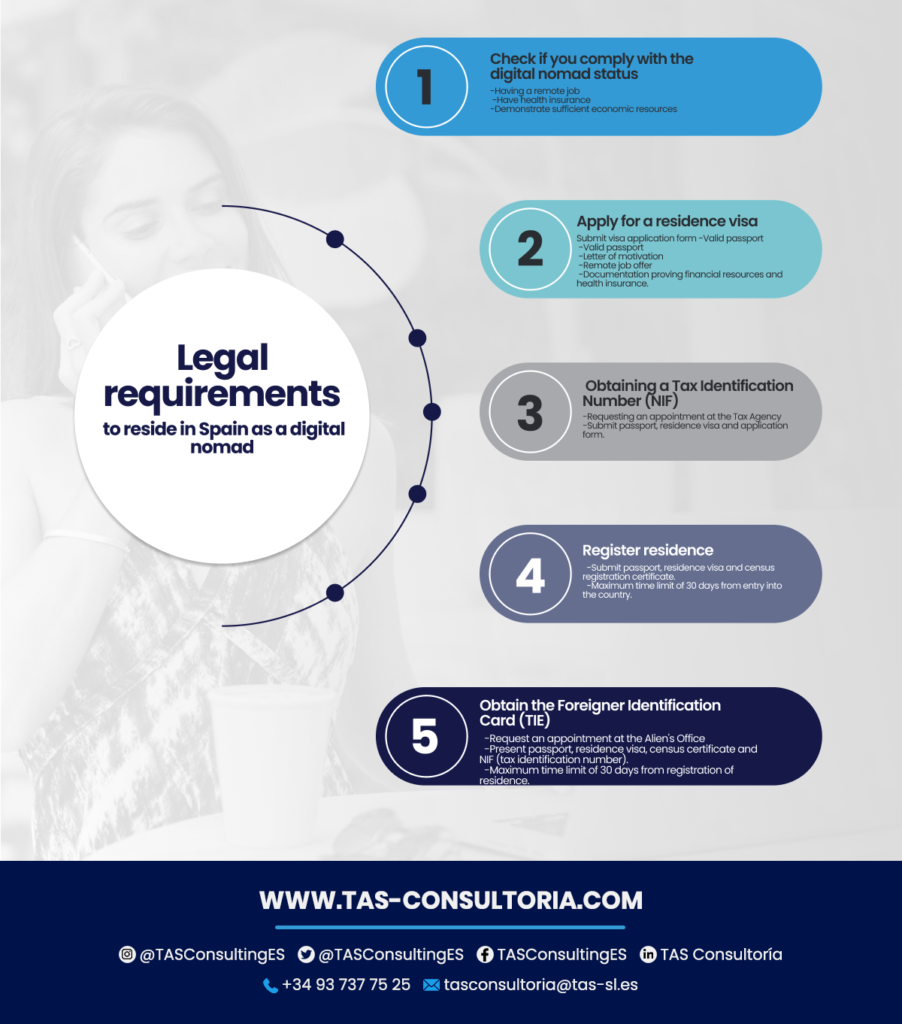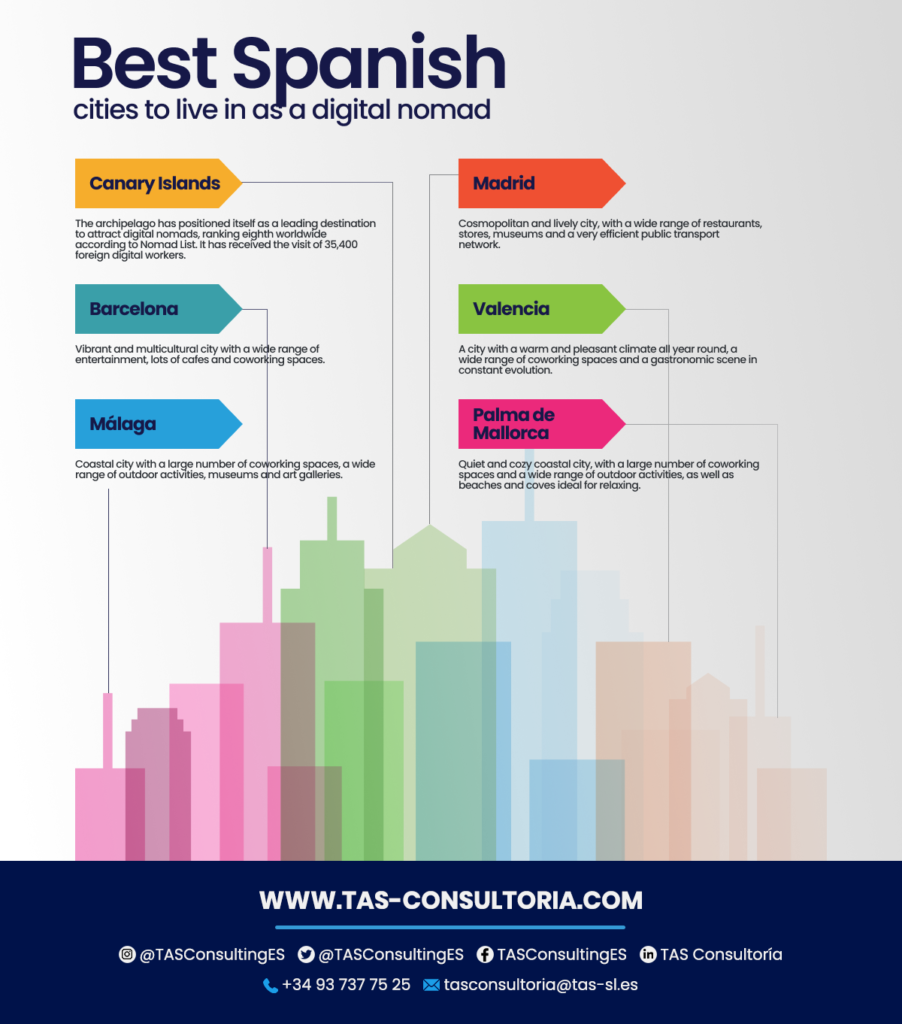
More and more people are working remotely from home using only a computer. These types of workers are known as digital nomads and, increasingly, their number is growing. In Spain, there is a new visa that regulates them and allows them to work from anywhere. Do you want to know how you can become a digital nomad and live in Spain? Here we tell you.
Legal requirements to reside in Spain as a digital nomad
The population of digital nomads in Spain has experienced a remarkable growth in recent years, driven by the growing supply of technology and the ease of working remotely.
A digital nomad has the ability to work from anywhere in the world, as long as he has access to the Internet, which allows him to combine his work with travel, adapting his lifestyle to his needs and preferences.
Although there are no exact figures, it is estimated that there are around 40,000 digital nomads in Spain, including engineers, designers, journalists and programmers, among others.
These professionals are having an impact on the economy and the way we work, as many companies are adapting their policies to attract and retain talent that is increasingly in demand.
Having said that, how have they been legally established in our country? Well, by complying with the following requirements:

You may also be interested in: B Corp: what is it and how to become one?
Visa options for digital nomads in Spain
Digital nomads who wish to reside legally in Spain have several visa options available. It is important to analyze each of these options in detail and choose the one that best suits your needs or personal circumstances as a digital nomad.
Here are the visa options for any digital nomad wishing to reside legally in Spain:
Residency Visa for Digital Nomads
This visa is the most common option for digital nomads who wish to reside legally in Spain because it is planned precisely for these types of workers.
To obtain it, it is necessary to comply with the established requirements: to have a remote job, health insurance and sufficient economic resources (as mentioned above). Once the visa is obtained, it will be possible to reside legally in Spain for a maximum period of one year.
Student Visa
A digital nomad wishing to study in Spain can opt for a student visa. This type of visa allows legal residence in the country during the study period, although it does not allow full-time employment. However, it is possible to work part-time, which can be a good option to supplement income.
Entrepreneur Visa
Digital nomads with a business project can also apply for an entrepreneur visa. This visa allows legal residence in Spain for a maximum period of one year and offers the possibility of working on the business project itself.
Non-Profit Residency Visa
This type of visa is aimed at those digital nomads who do not have a remote job, but do have sufficient financial resources to reside in the country without working.
In order to obtain this visa, it is necessary to demonstrate that one has the necessary economic resources to support oneself during the period of stay in Spain.
You may also be interested in: E-invoicing: the new mandatory regulation for Spanish companies
Best Spanish cities to live in as a digital nomad
The world of work has evolved and is no longer the way it used to be. Now, we are a global society, which has given rise to a new lifestyle without boundaries. Thanks to the internet and more flexible working conditions, a generation of digital nomads has emerged, working from anywhere in the world.
Spain is an ideal destination for any digital nomad, but the question arises as to where to settle. With a varied geography, each Spanish city has its own particularities. So how do you decide which is the best option for you?
There are several cities in our country that are considered ideal for digital nomads in portals such as Nomad List. Here we list them for you:

Spain has a wide variety of cities that are ideal for living as a digital nomad. Of course, it is important to carefully evaluate the options and select the city that best suits the needs and personal preferences of each digital nomad.
6 tips for finding accommodation and working in Spain as a digital nomad
There are several options available for digital nomads looking for accommodation and work opportunities in Spain. By following these tips, you will be able to find the perfect accommodation option for you and enjoy all the amenities that working as a digital nomad has to offer:
Research on the different neighborhoods and areas of the city.
Before looking for accommodation, research the different neighborhoods and areas of the city where you would like to live as a digital nomad. Consider factors such as proximity to coworking spaces, access to public transportation and whether essential services are available.
Uses temporary housing platforms
There are several online platforms such as Airbnb, Booking.com and HomeAway that offer temporary accommodation (not hotels or even traditional residences). These options are ideal for any digital nomad, because they can be a good alternative if you don’t want to commit to a long-term lease.
Search for shared accommodation
Another option to save on accommodation costs as a digital nomad is to look for shared accommodation with other digital nomads or locals. You can find options on websites like Idealista or Comparto Piso.
Verify internet connection
Being a digital nomad, you should make sure that the accommodation you choose has a reliable and high-speed internet connection. Many coworking spaces also offer temporary accommodation, which can be a useful option – two benefits in one!
Search for coworking spaces
With the digital nomad lifestyle, look for coworking spaces in the city where you are located, as they can be a great way to connect with other freelancers and find new job opportunities.
The objective of this practice is to reduce the costs of renting a traditional workspace (which in this case is not feasible), facilitate collaboration and knowledge sharing between professionals from different sectors, as well as provide a productive and creative work environment.
In these spaces, there are often different services included such as high speed internet access, meeting rooms, printers and coffee breaks.
Explore public transportation options
Research the public transportation options available in the city to get to coworking spaces and other places of interest. You may also consider alternative transportation options, such as bicycles or electric scooters.
Spain offers multiple options for any digital nomad to reside and work in the country. However, it is important to take into account the different forms of residence and the corresponding tax or legal obligations.
You may also be interested in: Digital Spain 2025: a basic guide
An advisor specialized in immigration and tax law can be of great help in this process, facilitating compliance with the necessary procedures and ensuring the legal security of the digital nomad.
If you are interested in establishing your residence in Spain as a digital nomad, do not hesitate to contact us to get personalized advice and carry out the whole process quickly and safely. Explore the lifestyle of the future!




Your email address will not be published .
Required fields are marked with *